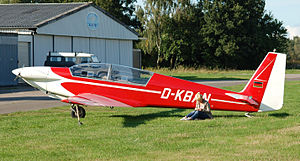Fournier RF 5
| RF 5 | |
|---|---|

| |
| Role | Motorglider |
| National origin | France |
| Designer | René Fournier |
| First flight | January 1968 |
The Fournier RF 5 is a two-seat motor glider designed by René Fournier.[1][2]
Design and development
The RF 5 is based on the single seater Fournier RF 4, and is a low-winged monoplane of all-wooden construction, with the crew of two sat in a tandem enclosed cockpit. It is semi-aerobatic with loops, stall turns, lazy eights, chandelles and spins approved.[3][4] It has a manually rectractable center landing gear, a steerable tailwheel and detachable outrigger landing gear.[4] Spoilers are available to reduce lift.[4] The wingtips of the parked aircraft can be unlocked and folded inwards by a single person to reduce required hangar space.
Variants
- RF 5B
- An improved high-performance version. Powered by a 50.7 kW (68 hp) Limbach SL 1700 E Comet engine.[5]
- RF 5B Sperber
- A high performance powered sailplane with 17.5 m (57 ft) span wings.
- AeroJaén RF5-AJ1 Serrania
- License built version produced by Aeronáutica del Jaén SA
Specifications (RF 5)

Data from Jane's All the World's Aircraft 1988-89,[6] Jane's All The World's Aircraft 1976–77[7]
General characteristics
- Crew: 2
- Length: 7.8 m (25 ft 7 in)
- Wingspan: 13.74 m (45 ft 1 in)
- Width: 8.6 m (28 ft 3 in) wings folded
- Height: 1.96 m (6 ft 5 in)
- Wing area: 15.12 m2 (162.8 sq ft)
- Aspect ratio: 12.5
- Airfoil: root:NACA 23015, tip:NACA 23012
- Empty weight: 420 kg (926 lb)
- Max takeoff weight: 650 kg (1,433 lb)
- Fuel capacity: 60 L (15.9 US gal; 13.2 imp gal)
- Powerplant: 1 × Limbach L2000 EOI 4-cyl. horizontally-opposed air-cooled piston engine, 60 kW (80 hp)
- Propellers: 2-bladed Hoffman HO-V-62-R/160 fixed pitch propeller
Performance
- Cruise speed: 209 km/h (130 mph, 113 kn)
- Stall speed: 80 km/h (49 mph, 43 kn) clean
- Never exceed speed: 250 km/h (155 mph, 135 kn) at max t/o weight
- Range: 700 km (430 mi, 380 nmi) to 900 km (490 nmi; 560 mi)
- Service ceiling: 5,000 m (16,000 ft)
- g limits: +6 -3
- Maximum glide ratio: 20
- Rate of climb: 3.29 m/s (648 ft/min) max
- Rate of sink: 1.4 m/s (280 ft/min) power off
- Wing loading: 42.99 kg/m2 (8.81 lb/sq ft) at max t/o weight
See also
Aircraft of comparable role, configuration, and era
Related lists
References
- ^ "RF 5". sailplanedirectory.com. Archived from the original on 12 November 2015. Retrieved 18 January 2015.
- ^ "Fournier aircraft history, performance and specifications". pilotfriend.com. Retrieved 18 January 2015.
- ^ "GROWN-UP ULTRA-LIGHT". Flight International: 974–977. 11 June 1970. Retrieved 18 January 2015.
- ^ a b c "RF 5 Flight Manual" (PDF). Retrieved 23 November 2017.
- ^ Taylor, Michael J H. (1989). Jane's Encyclopedia of Aviation. London: Portland House. p. 838. ISBN 0-517-69186-8.
- ^ John W.R. Taylor, ed. (1988). Jane's All the World's Aircraft 1988-89. London: Jane's Information Group. ISBN 0-7106-0867-5.
- ^ John W.R. Taylor, ed. (1976). Jane's All the World's Aircraft 1976-77. London: Jane's yearbooks. pp. 570–571. ISBN 0-354-00538-3.
